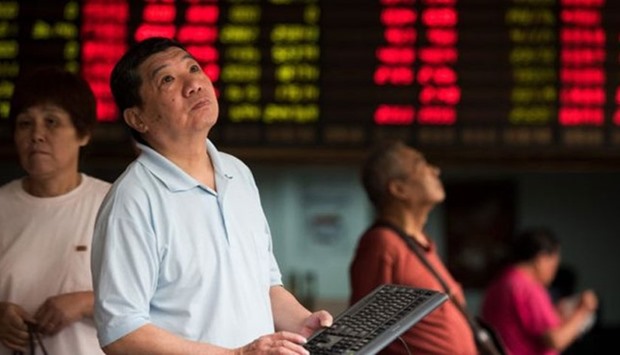Shanghai stocks swung sharply again Tuesday on continuing worries about China's economy, while most other Asian markets extended losses in one of the worst trading starts to a year.
After dropping more than five percent Monday -- taking its losses this year to almost 15 percent already -- Shanghai rallied in the first few minutes before quickly see-sawing in and out of positive territory through the day.
The swift movements have become common on the volatile index, which has been hammered by a string of weak economic data out of China. The authorities' bungled handling of last week's stocks rout has also sowed doubt.
Beijing's weakening of its yuan currency -- raising questions about the opaqueness of its exchange rate policy -- also played a key role in the equities downturn.
That has in turn led to massive losses around the world, with several major bourses suffering their worst start to a year on record.
On Tuesday the overnight rate which banks charge each other to borrow yuan in Hong Kong surged 53 percentage points to a record high of 67 percent, amid speculation China's central bank was buying huge amounts of the unit.
"Worries about China persist," Shane Oliver, head of investment strategy in Sydney at AMP Capital Investors, told Bloomberg News.
"It's too early to say that we've found the bottom until we see more stability in the Chinese currency and until we see more confidence regarding global growth."
Shanghai ended 0.2 percent higher but Hong Kong, which also tumbled Monday, lost 0.9 percent.
Tokyo, which was closed Monday for a holiday, sank 2.7 percent as dealers there played catch-up with the rest of the region and the yen strengthened against the dollar.
The Japanese unit has risen more than two percent on the greenback so far this year.
- Oil falls below $31 -
Sydney slipped 0.1 percent by the end of trade and Seoul lost 0.2 percent.
In early European trade London edged up 0.1 percent, and Paris and Frankfurt each gained 0.1 percent.
In Hong Kong analysts said the People's Bank of China had likely stepped in to prop up the yuan and fend off speculators as the unit tumbles.
Albert Leung, a Hong Kong-based rates strategist at Nomura Holdings, added that he expected yuan interest rates to "remain highly volatile in the next couple of days".
US markets provided some positivity, with the Dow and S&P 500 moving higher Monday. However, investors remain on edge over China and over the fall in oil prices due to a supply glut, anaemic demand and a weak global economy.
Crude slipped below $31 for the first time in 12 years on signs key producer Iran could be allowed to export the commodity within weeks as the West prepares to lift embargoes after a deal over its nuclear programme.
On Tuesday US benchmark West Texas Intermediate was down 2.4 percent and Brent lost 2.5 percent.
On currency markets the dollar retreated against the yen and euro but advanced against most emerging-market currencies, with the ringgit in crude-dependent Malaysia hit by falling oil prices.
The ringgit slipped 0.7 percent, while South Korea's won lost 0.1 percent, the Australian dollar slipped 0.7 percent and the Indonesian rupiah shed 0.4 percent. The Singapore and New Zealand dollar were also under pressure.

